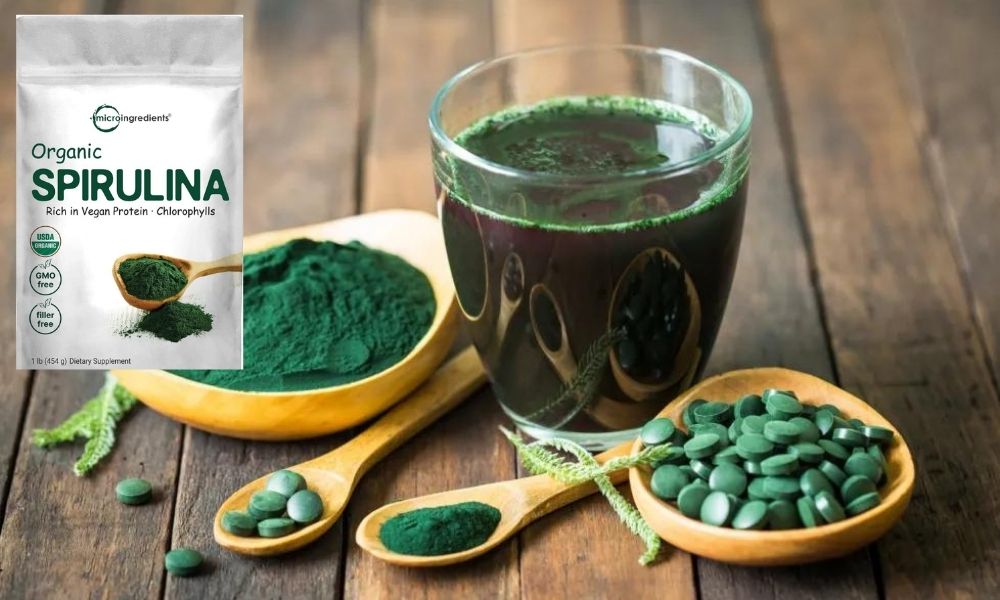Spirulina is a type of blue-green algae that has been consumed for centuries due to its numerous health benefits. It is considered a superfood, packed with essential nutrients and antioxidants that can improve overall health and well-being. In recent years, spirulina has gained popularity as a dietary supplement and has been incorporated into various health products. In this article, we will delve into the health benefits of spirulina and explore why it has become a staple in many people’s diets.
Contents
What is Spirulina?
Spirulina is a type of cyanobacteria, also known as blue-green algae, that grows in both fresh and saltwater. It is a spiral-shaped microorganism that is rich in protein, vitamins, minerals, and antioxidants. It has been consumed by various cultures for centuries, with the Aztecs being one of the first to recognize its nutritional value. Today, spirulina is commercially cultivated and is available in various forms, including powder, tablets, and capsules.
Nutritional Profile of Spirulina
Spirulina is often referred to as a superfood due to its impressive nutritional profile. It is a rich source of protein, containing all essential amino acids, making it a complete protein source for vegetarians and vegans. It also contains a variety of vitamins and minerals, including vitamins B, C, and E, iron, magnesium, and potassium. Additionally, spirulina is a potent source of antioxidants, including phycocyanin, which gives it its distinctive blue-green color.
Read:What are the health benefits of cabbage?One tablespoon (7 grams) of dried spirulina contains:
- 4 grams of protein
- 11% of the recommended daily intake (RDI) of vitamin B1 (thiamine)
- 15% of the RDI of vitamin B2 (riboflavin)
- 4% of the RDI of vitamin B3 (niacin)
- 21% of the RDI of copper
- 11% of the RDI of iron
- 7% of the RDI of magnesium
- 4% of the RDI of potassium
Health Benefits of Spirulina
The impressive nutritional profile of spirulina translates into numerous health benefits. Here are some of the most notable health benefits of consuming spirulina:
1. Rich in Antioxidants
Spirulina is a potent source of antioxidants, which are compounds that protect the body from damage caused by free radicals. Free radicals are unstable molecules that can cause oxidative stress, leading to chronic diseases such as cancer, heart disease, and diabetes. The antioxidants in spirulina, including phycocyanin and beta-carotene, can neutralize free radicals and prevent oxidative damage.
2. Boosts Immune System
The antioxidants in spirulina not only protect the body from diseases but also boost the immune system. A strong immune system is essential for fighting off infections and illnesses. Studies have shown that spirulina can increase the production of white blood cells, which are responsible for fighting off foreign invaders in the body.
Read:Which benefit may result from using mental health services?3. Improves Heart Health
Heart disease is the leading cause of death globally, and a healthy diet is crucial for preventing it. Spirulina has been shown to have a positive effect on heart health, primarily due to its antioxidant and anti-inflammatory properties. Studies have also shown that spirulina can lower LDL (bad) cholesterol levels and increase HDL (good) cholesterol levels, reducing the risk of heart disease.
4. May Help Manage Diabetes
Spirulina may also be beneficial for individuals with diabetes. Studies have shown that spirulina can improve insulin sensitivity and lower blood sugar levels, making it a potential natural treatment for diabetes. Additionally, the antioxidants in spirulina can protect against diabetes-related complications, such as nerve damage and kidney disease.
5. Supports Brain Health
The antioxidants in spirulina can also have a positive impact on brain health. Oxidative stress has been linked to neurodegenerative diseases such as Alzheimer’s and Parkinson’s. The antioxidants in spirulina can protect against oxidative damage and may help prevent these diseases. Additionally, spirulina contains an amino acid called phenylalanine, which has been shown to improve cognitive function and memory.
6. May Aid in Weight Loss
Spirulina may also be beneficial for individuals looking to lose weight. It is low in calories but high in nutrients, making it a great addition to a weight loss diet. Additionally, spirulina has been shown to reduce appetite and increase feelings of fullness, which can help with weight loss efforts.
Read:What is alpha lipoic acid benefits?7. May Improve Allergic Rhinitis Symptoms
Allergic rhinitis, also known as hay fever, is a common condition that causes symptoms such as sneezing, runny nose, and itchy eyes. Studies have shown that spirulina can reduce the severity of these symptoms, making it a potential natural treatment for allergic rhinitis.
How to Incorporate Spirulina into Your Diet
Spirulina is available in various forms, including powder, tablets, and capsules. It has a strong, earthy taste, so it is often recommended to mix it with other foods or beverages. Here are some ways to incorporate spirulina into your diet:
- Add a tablespoon of spirulina powder to your smoothie or juice.
- Mix spirulina powder into your yogurt or oatmeal.
- Blend spirulina powder into homemade energy balls or bars.
- Take spirulina tablets or capsules with water.
Are There Any Side Effects?
Spirulina is generally considered safe for most people. However, some individuals may experience mild side effects, such as nausea, stomach pain, or diarrhea. It is essential to purchase spirulina from a reputable source to ensure its purity and safety. Additionally, individuals with certain medical conditions, such as autoimmune diseases, should consult their doctor before consuming spirulina.
Conclusion:
Spirulina is a nutrient-dense superfood that offers numerous health benefits. It is a rich source of protein, vitamins, minerals, and antioxidants, making it a valuable addition to any diet. From boosting the immune system to improving heart health and aiding in weight loss, spirulina has a lot to offer. However, it is essential to purchase spirulina from a reputable source and consult a doctor before consuming it, especially if you have any underlying medical conditions. With its impressive nutritional profile and potential health benefits, spirulina is undoubtedly a superfood worth incorporating into your diet.









